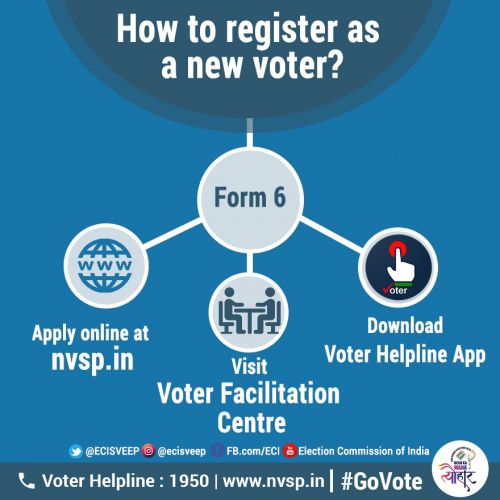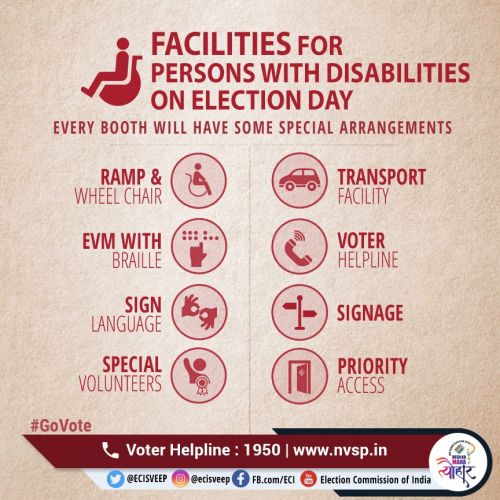-
New Initiative
-
1
CLEAN SVEEP - Gujarat Bi-monthly Magazine
A unique initiative by Gujarat a bi-monthly magazine named "Clean SVEEP". Unique SVEEP activities carried out at State as well as District Level are included in this magazine. Newletter_Clean SVEEP_Gujarat.pdf -
2
Exhibition: Unfolding Indian Elections & SVEEP Initiatives
On the occasion of National Consultation on Accessible Elections organised on July 3rd & 4th July, 2018, an exhibition was setup by Election Commission of India showcasing the journey of elections in India, the largest democracy in the world. The Exhibition was inaugurated by Chief Election Commissioner O P Rawat and Election Commissioners Sunil Arora and Ashok Lavasa, marking the beginning of the proceedings. The exhibition comprised two sections: 1. Unfolding Indian Elections: India has been able to uphold its democracy, through the ebb and flow of the political and security challenges. Proving its detractors wrong, the country has survived the crisis that befell on many Asian and African nations in post-colonial era. A large measure of credit goes to the free and fair elections. They have reflected people’s will and provided for seamless transition of power at the Centre and States. 2. SVEEP initiatives: Recent SVEEP initiatives & endeavours were showcased including the new initiatives for PwDs.Following are the snippets from the exhibition showcasing the stepping stone of this journey. Model Polling Booth A Model Polling Booth was set-up during the two days National Consultation on Accessible Elections. The Consultation saw the participation of more than 50 Civil Society Organizations and all the Chief Electoral Officers of States/UTs besides members of National Political Parties and Ministries, Government of India and media. The motive of the Model Polling Booth was to familiarise the stakeholders with the process of voting and related aspects. Persons with Disabilities were motivated to take up the Mock Poll and provide the feedback which was further incorporated in the recommendations. The National Consultation on Accessible Elections was the culmination of more than 3month long series of District-Level and State-Level Workshops undertaken as a part of ECI’s theme for 2018- Accessible Elections, to identify barriers in the inclusion of PwDs in the electoral process, assess the present accessibility policies in place and put forward recommendations for addressing barriers to enhance the participation of the differently-abled. -
3
Building Human Resource: Trainings for ELCs
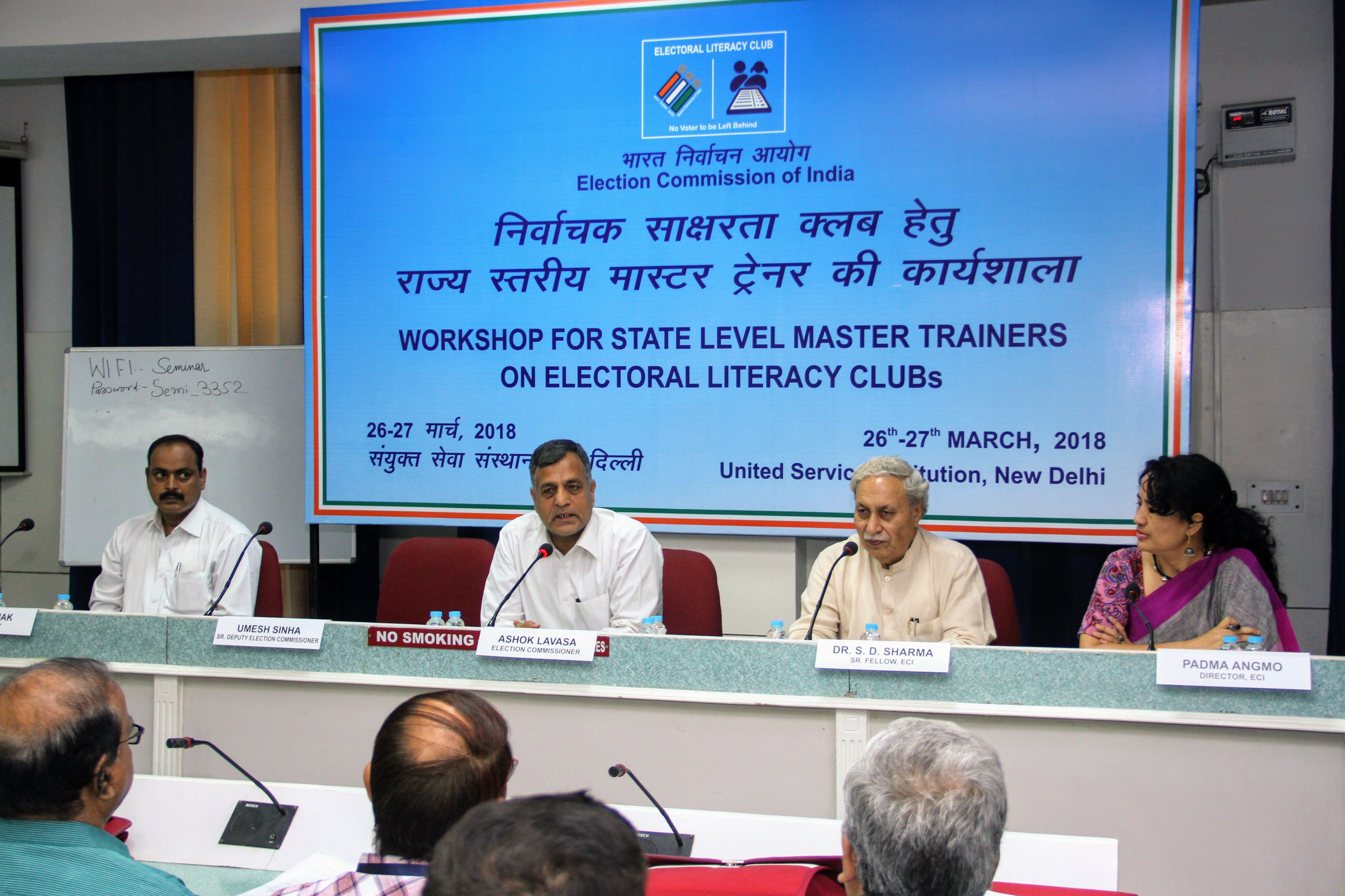 A major component of the ELCs programme in its execution phase was the training of ELC conveners. Considering the sheer magnitude of the numbers the project is dealing with, devising a training program itself proved to be a challenge. Finally, a system of cascaded training was adopted. ELC Workshops for training SLMTs Workshops were conducted for State Level Master Trainers from the 36 states and union territories of the country in four batches of 40-50 participants each, in February-March 2018. Considering the activity based engagement approach that formed the basis of the ELC project, and the resources developed, the training was also planned in an activity based manner to engage the trainers rather than following a lecture based format. The vibrant workshop witnessed enthusiastic State Level Master Trainers, who were identified by the office of the Chief Electoral Officer (CEO) of every State, trying out the learning tools themselves and engaging in the various activities. These State Level Master Trainers now hold the responsibility of further training District Level Master Trainers, identified by the District Election Officers, who will then train the specific ELC conveners falling in their respective districts. ELC Training of SVEEP Nodal Officers On 13th April 2018, the SVEEP Nodal Officers of all States and UTs were invited to ECI headquarters at New Delhi, for a daylong meeting to discuss the preparedness for the Electoral Literacy Clubs project. The second half of this meeting was centered around acquainting all SVEEP Nodal Officers with the various activities prepared for ELCs wherein the SNOs, who were part of one or the other training workshops, took the lead. The 35 Nodal Officers were divided into 5 groups and allotted 2-3 activities each. After one hour, each group made a presentation to the remaining SNOs on their activities, thus familiarizing all in the process. ELC Workshop for training CSOs A final leg of trainings was conducted under the ELC project on the 23rd and 24th of May, 2018 at USI, New Delhi. However, this training workshop was different from others as its participants were not members of the election machinery, but in fact members of various Civil Society Organizations from across the nation. The workshop observed the participation of 43 participants from 23 States and Union Territories. The participants were mostly associated with CSOs who have previously partnered with the Commission or CEOs for voter awareness campaigns. These CSOs covered issues related to Persons with Disabilities (PwDs), rural poor, poverty alleviation, education and literacy etc. The idea now is, that CSOs will take forward the initiative of imparting electoral literacy through games and activities within their respective organizations as well as the communities they work with.
A major component of the ELCs programme in its execution phase was the training of ELC conveners. Considering the sheer magnitude of the numbers the project is dealing with, devising a training program itself proved to be a challenge. Finally, a system of cascaded training was adopted. ELC Workshops for training SLMTs Workshops were conducted for State Level Master Trainers from the 36 states and union territories of the country in four batches of 40-50 participants each, in February-March 2018. Considering the activity based engagement approach that formed the basis of the ELC project, and the resources developed, the training was also planned in an activity based manner to engage the trainers rather than following a lecture based format. The vibrant workshop witnessed enthusiastic State Level Master Trainers, who were identified by the office of the Chief Electoral Officer (CEO) of every State, trying out the learning tools themselves and engaging in the various activities. These State Level Master Trainers now hold the responsibility of further training District Level Master Trainers, identified by the District Election Officers, who will then train the specific ELC conveners falling in their respective districts. ELC Training of SVEEP Nodal Officers On 13th April 2018, the SVEEP Nodal Officers of all States and UTs were invited to ECI headquarters at New Delhi, for a daylong meeting to discuss the preparedness for the Electoral Literacy Clubs project. The second half of this meeting was centered around acquainting all SVEEP Nodal Officers with the various activities prepared for ELCs wherein the SNOs, who were part of one or the other training workshops, took the lead. The 35 Nodal Officers were divided into 5 groups and allotted 2-3 activities each. After one hour, each group made a presentation to the remaining SNOs on their activities, thus familiarizing all in the process. ELC Workshop for training CSOs A final leg of trainings was conducted under the ELC project on the 23rd and 24th of May, 2018 at USI, New Delhi. However, this training workshop was different from others as its participants were not members of the election machinery, but in fact members of various Civil Society Organizations from across the nation. The workshop observed the participation of 43 participants from 23 States and Union Territories. The participants were mostly associated with CSOs who have previously partnered with the Commission or CEOs for voter awareness campaigns. These CSOs covered issues related to Persons with Disabilities (PwDs), rural poor, poverty alleviation, education and literacy etc. The idea now is, that CSOs will take forward the initiative of imparting electoral literacy through games and activities within their respective organizations as well as the communities they work with. -
4
Electoral Literacy Clubs - Taking the journey ahead
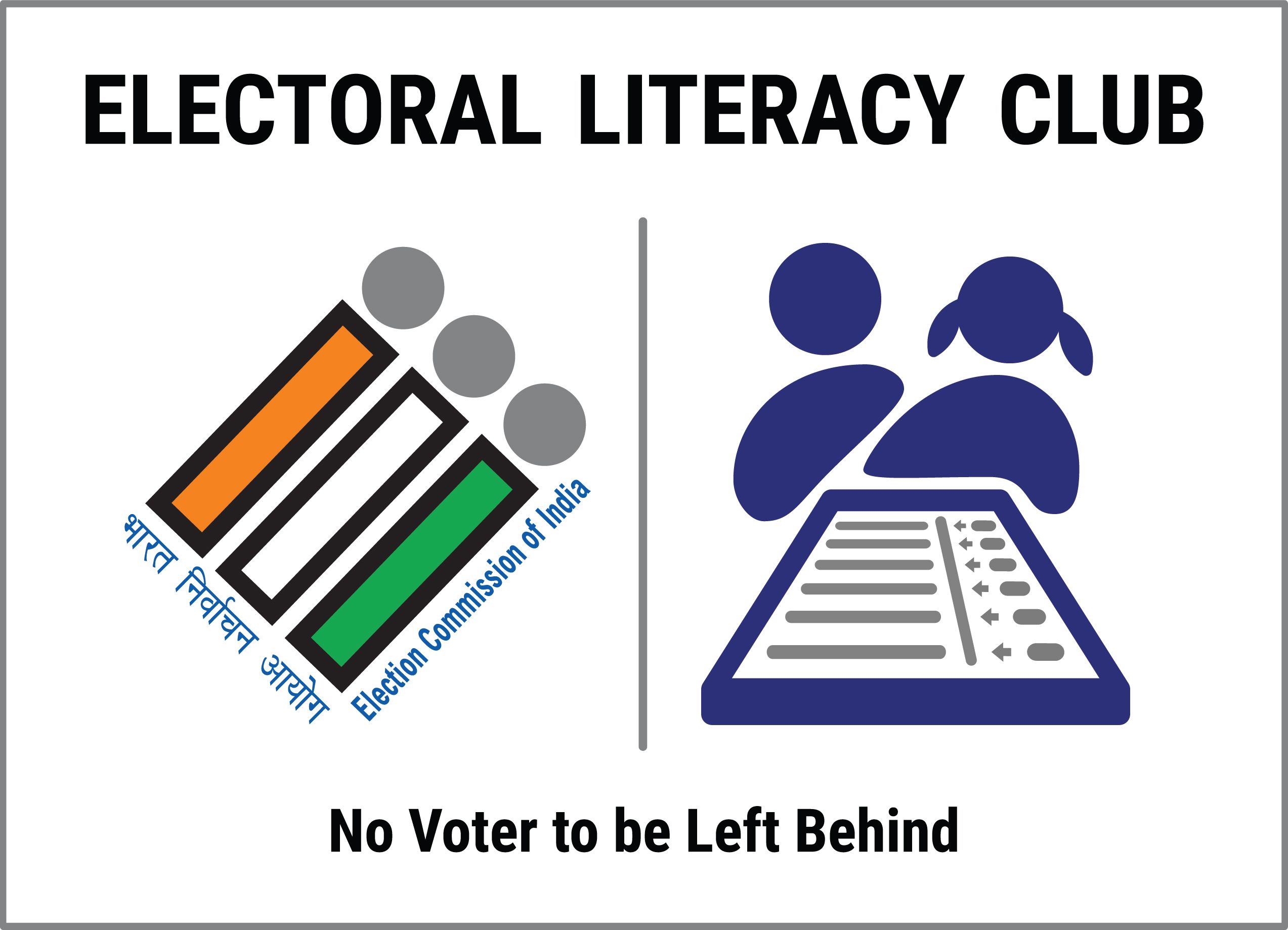 Studies suggest that participation in the first one or two elections of an elector’s lifetime helps to inculcate the habit of voting and makes participation in future elections more likely. The importance of developing the practice of citizenship development for electoral participation is vital to investment in the future of democracy. It is necessary to focus on the younger generation for civic education leading to robust electoral participation. Keeping this rationale in view, the Election Commission of India (ECI) took a landmark step towards the cause of electoral literacy with its initiative - ‘Mainstreaming of Electoral Literacy through Educational Institutions, Organizations and Communities in India’, under its Systematic Voters’ Education & Electoral Participation (SVEEP) Programme. The entire project revolves around keeping voter education relevant and practical through a host of curricular, co-curricular and extra-curricular methods for the young (18-21 years) and future (14-17 years) voters. This year, ECI committed its efforts towards the inclusion of electoral literacy through the medium of Electoral Literacy Clubs (ELCs) in educational institutions, organisations as well as in rural communities via Chunav Pathshalas. A total of seven comprehensive resource guides have been created for the ELCs programme. These are - Electoral Literacy Club Resource Guide for class IX Electoral Literacy Club Resource Guide for class X Electoral Literacy Club Resource Guide for class XI Electoral Literacy Club Resource Guide for class XII Electoral Literacy Club Resource Guide for colleges Chunav Pathshala Electoral Literacy Club Resource Guide for communities ELCs common handbook Along with these resource guides, an ELC game kit consisting of five floor games has also been developed. The resource guides and games have been developed in Hindi and English. States shall translate the content in their regional languages and adapt them to suit regional and local sensibilities. The resource guides and floor games can be accessed at http://ecisveep.nic.in . Set-up of ELCs ELC shall be for each Class and Section. While the Electoral Literacy Clubs for each school grade will be different and consist of a set of activities unique to that particular grade, the activities for different Sections at each grade shall remain the same. The ELC shall conduct activity class wise in a scheduled class/session. One or two teachers from the Humanities Department of the School will act as the Nodal Officers and mentors of the ELC. There would be a teacher for each class who will conduct the ELC activity. Alternately, there may be a group of teachers who may conduct the ELCs of various classes. The training of the teachers shall be taken up by the Nodal Officer. The teachers shall be guided by the Nodal Officer in the conduct of the ELC activities. A balance between Senior secondary schools within every state and district will be identified by the office of the District Election Officer (DEO), schools are being covered under phases. ELCs and PwDs The ELCs have been envisioned as inclusive clubs that must make every attempt to ensure the participation of students with disabilities. To ensure this, every ELC shall follow the following guidelines – The Convener shall make efforts to promote inclusion and sensitize members about the same. It should be tried to ensure that the venue for ELC activity is easily accessible. If a student with hearing impairment is attending the meeting, a sign language interpreter should be made available for their convenience (the interpreter can be a companion that the student already has). Any activity conducted in the club should not leave behind students with disabilities. Going Online: ELC Resources on SVEEP Portal The Election Commission of India has developed a new portal for SVEEP where all tools and instructions regarding ELCs can be easily accessed by the Master Trainers (MTs) and the portal provides a discussion forum to the ELC MTs. The portal will also serve as a mechanism for collecting feedback, for reviewing the resource tools and updating them. A tool for trainings: the ELC Documentary For the purpose of being used as a visual aid in the cascade training strategy, ECI is also preparing a documentary on ELCs which is essentially a collection of major activities under the project, shot and assembled in the format of tutorials. The documentary is being produced in Hindi as well as in English along with captions for the convenience of persons with hearing disabilities. Assessment by National Law University ELC is indeed one of the most ambitious and challenging projects of the ECI. Well begun is half done, and a good beginning has already been made. An independent evaluation of the project has also been sanctioned by the Commission and evaluation shall be simultaneously carried out so that necessary corrections can be made for successful achievement of the objectives. Research scholars from NLU are on board with ECI for conducting an evaluation and impact assessment research on the effectiveness of the ELC programme. NLU has planned out its research methodology and timelines. It is currently preparing tools for carrying out the research.
Studies suggest that participation in the first one or two elections of an elector’s lifetime helps to inculcate the habit of voting and makes participation in future elections more likely. The importance of developing the practice of citizenship development for electoral participation is vital to investment in the future of democracy. It is necessary to focus on the younger generation for civic education leading to robust electoral participation. Keeping this rationale in view, the Election Commission of India (ECI) took a landmark step towards the cause of electoral literacy with its initiative - ‘Mainstreaming of Electoral Literacy through Educational Institutions, Organizations and Communities in India’, under its Systematic Voters’ Education & Electoral Participation (SVEEP) Programme. The entire project revolves around keeping voter education relevant and practical through a host of curricular, co-curricular and extra-curricular methods for the young (18-21 years) and future (14-17 years) voters. This year, ECI committed its efforts towards the inclusion of electoral literacy through the medium of Electoral Literacy Clubs (ELCs) in educational institutions, organisations as well as in rural communities via Chunav Pathshalas. A total of seven comprehensive resource guides have been created for the ELCs programme. These are - Electoral Literacy Club Resource Guide for class IX Electoral Literacy Club Resource Guide for class X Electoral Literacy Club Resource Guide for class XI Electoral Literacy Club Resource Guide for class XII Electoral Literacy Club Resource Guide for colleges Chunav Pathshala Electoral Literacy Club Resource Guide for communities ELCs common handbook Along with these resource guides, an ELC game kit consisting of five floor games has also been developed. The resource guides and games have been developed in Hindi and English. States shall translate the content in their regional languages and adapt them to suit regional and local sensibilities. The resource guides and floor games can be accessed at http://ecisveep.nic.in . Set-up of ELCs ELC shall be for each Class and Section. While the Electoral Literacy Clubs for each school grade will be different and consist of a set of activities unique to that particular grade, the activities for different Sections at each grade shall remain the same. The ELC shall conduct activity class wise in a scheduled class/session. One or two teachers from the Humanities Department of the School will act as the Nodal Officers and mentors of the ELC. There would be a teacher for each class who will conduct the ELC activity. Alternately, there may be a group of teachers who may conduct the ELCs of various classes. The training of the teachers shall be taken up by the Nodal Officer. The teachers shall be guided by the Nodal Officer in the conduct of the ELC activities. A balance between Senior secondary schools within every state and district will be identified by the office of the District Election Officer (DEO), schools are being covered under phases. ELCs and PwDs The ELCs have been envisioned as inclusive clubs that must make every attempt to ensure the participation of students with disabilities. To ensure this, every ELC shall follow the following guidelines – The Convener shall make efforts to promote inclusion and sensitize members about the same. It should be tried to ensure that the venue for ELC activity is easily accessible. If a student with hearing impairment is attending the meeting, a sign language interpreter should be made available for their convenience (the interpreter can be a companion that the student already has). Any activity conducted in the club should not leave behind students with disabilities. Going Online: ELC Resources on SVEEP Portal The Election Commission of India has developed a new portal for SVEEP where all tools and instructions regarding ELCs can be easily accessed by the Master Trainers (MTs) and the portal provides a discussion forum to the ELC MTs. The portal will also serve as a mechanism for collecting feedback, for reviewing the resource tools and updating them. A tool for trainings: the ELC Documentary For the purpose of being used as a visual aid in the cascade training strategy, ECI is also preparing a documentary on ELCs which is essentially a collection of major activities under the project, shot and assembled in the format of tutorials. The documentary is being produced in Hindi as well as in English along with captions for the convenience of persons with hearing disabilities. Assessment by National Law University ELC is indeed one of the most ambitious and challenging projects of the ECI. Well begun is half done, and a good beginning has already been made. An independent evaluation of the project has also been sanctioned by the Commission and evaluation shall be simultaneously carried out so that necessary corrections can be made for successful achievement of the objectives. Research scholars from NLU are on board with ECI for conducting an evaluation and impact assessment research on the effectiveness of the ELC programme. NLU has planned out its research methodology and timelines. It is currently preparing tools for carrying out the research. -
5
Sneak Peek into some ELC Activities
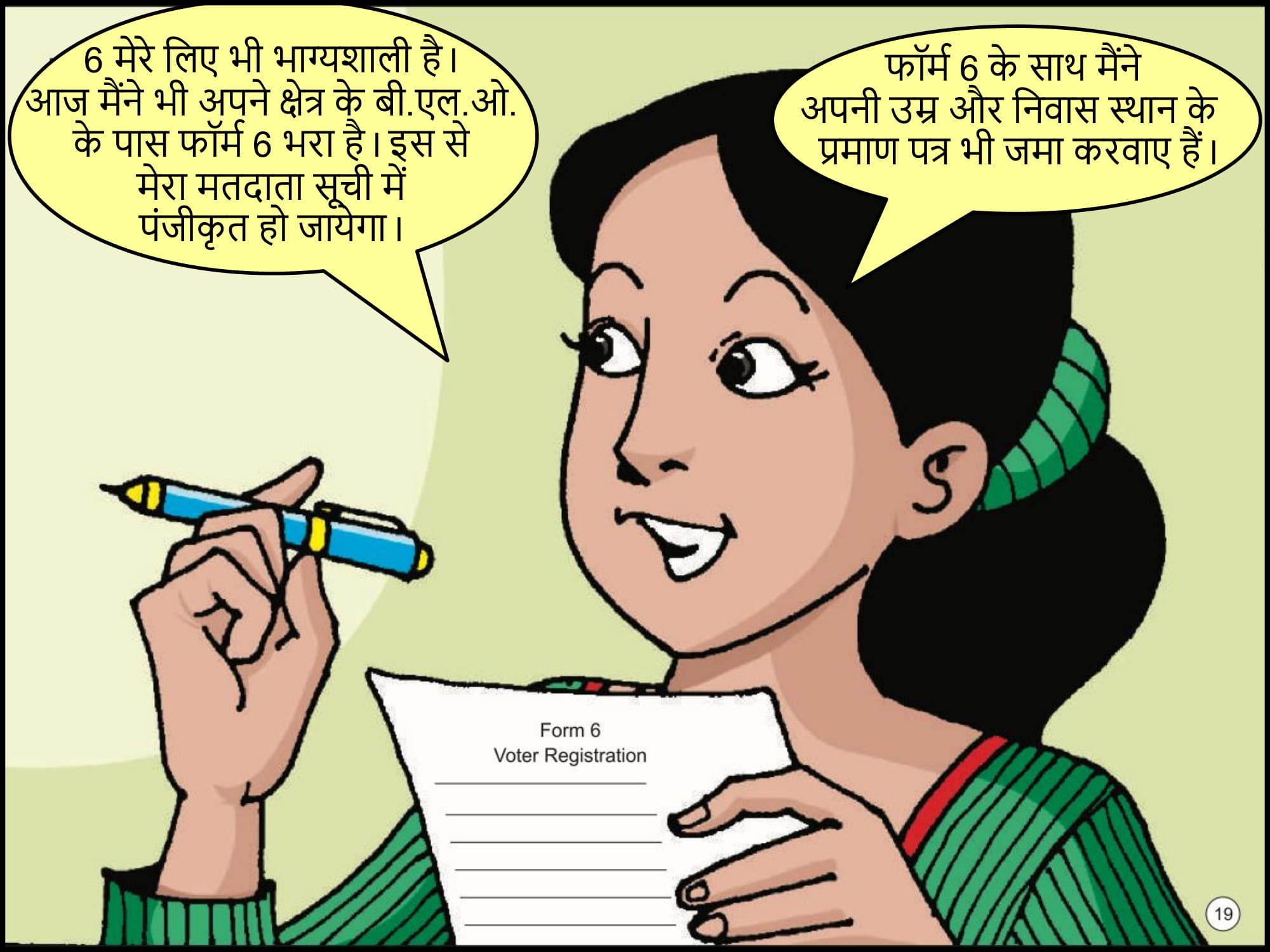 A majority of educators will agree that students grasp the most when learning meets fun. The ELC learning tools have been developed in a manner such that important information, which might seem banal in textbooks, is imparted in engaging ways to young students. The following are a description of six activities out of a total of 30 that have been developed for the ELCs: 1. Nirvachitra A portmanteau of the words Nirvachan and Chalchitra, Nirvachitra introduces the electoral process and procedures through an engaging film show or a picture story scroll developed by the ECI. Nirvachitra is the first activity proposed for all ELCs to set the tone of the club. Set in the environment of Class XII students in a school from a rural area, the film Masti, Dosti aur Matdaan, covers the basics of voter registration by introducing concepts like democracy and value of a vote as well as talking about the age of eligibility, how to register as a voter, the documents required, etc., through its animated characters. For schools where screening the film is not possible, story scrolls have been developed that send out the same message with their characters Abha and Abhay. Before the film screening, the convener (teacher) shall have an introductory discussion with the students where their knowledge and views on democracy, voting, etc., are gauged. Post the film/scroll show, students are prompted to recall their first memories of an actual election held in their vicinity irrespective of their parents/guardians/relatives/neighbours' participation and make a poster either on the most important takeaway of the film or on the importance of elections and voting. 2. Card Game Drawing inspiration from the popular card game UNO, two card games Vigilant Voter and Be the People’s Representative have been developed. Each deck consists of six cards in five colours along with some lucky and unlucky cards to make the game interesting. Each of the six numbered cards carry messages specific to the respective games. The player who arranges all the six cards in their correct order in a single chosen colour and reads out the messages stated on the cards correctly, wins the game. The Vigilant Voter enables the players to play through the perspective of a voter. The six cards break down the entire registration and voting process, right from eligibility till poll day, into six key messages. The Be a People’s Representative game lets the players don the role of a contesting candidate and breaks down the candidate’s journey in an election to six messages in six cards. The idea of the card games is that while playing, the students absorb the messages communicated while still enjoying a good game. 3. Build your Ballot An activity developed specifically for the students of class IX, Build your Ballot is aimed at familiarizing the students with EVM (Electronic Voting Machine) and VVPAT (Voter Verifiable Paper Audit Trail). Through this activity students will make their own ballot paper with dummy candidates and symbols including NOTA. The game requires 15 students as volunteering candidates of a hypothetical election. The aim is for the entire class to make their own ballot paper. For this purpose a chart paper is used to make the layout of a dummy ballot paper. Fifteen pre-decided symbols denoting state parties, national parties, registered parties and individual candidates are shuffled and randomly allotted one each to every student acting as a candidate. Following this, the candidates come forward and alphabetically arrange their names on the ballot paper according to actual ECI guidelines. First, the students with state and national party symbols come forward to form category I and write their names alphabetically on the ballot, and stick/draw their symbols against their name. Category II is formed by registered party candidates. Last but not the least, individual candidates arrange their names on the ballot. The idea behind building the ballot is for the voters to realize that candidates are arranged on the ballot in an unbiased manner according to set guidelines, and give an idea on where to find the name of the candidate of choice on the ballot. 4. Hopscotch – Matdaan ke Padav Matdaan ke Padav or Steps to Vote, is a stapu (hopscotch) game designed to familiarize students with the steps of voting. The game is printed on a flex and laid on the ground for students to play. It consists of 10 steps with each step carrying a question. The player has to hop and stand on one foot throughout the game and will lose if the other foot touches the ground. The player enters the game by standing at the start position and throws a coin inside the first rectangle which is the first step of the game. S/he then reads out the question written inside the rectangle loudly for all to hear and answers it in either “Yes” or “No”. Similarly, the player progresses by throwing the coin in the next rectangle and repeating the process until they reach the tenth and the last rectangle. The game creates awareness amongst players by asking questions like “Should we check our names in the voters’ list before elections?”, “Before entering the polling station should we keep our identity proof and voters’ slip ready?”, “On the EVM, do we have to press a button in front of the name of a candidate we have chosen?” 5. NOTA NOTA stands for None of the Above. If a voter does not wish to vote for any political representative, s/he can still exercise their franchise by voting for NOTA. The activity, for students of class X, introduces the concept of NOTA to the students in a humorous way and sends out the message that knowing what you do not want is as important as knowing what you want. This activity uses colourful, visual flashcards. Each flashcard poses a question and offers four answers to the question. The first three options are deliberately funny, silly and incorrect. For example, if the question is, “Which one of the following is a means of transport?” The first three options to this question are a water bottle, a hen and a carpet. The fourth option to every question is NOTA. Thus students choose NOTA as the answer to every question, familiarizing them with the concept in the process. However, post the flashcard display, the convener brings out one final round where the following question is verbally asked - “Who do you vote for?” The answers would include: A corrupt politician bribing people to vote in his/her favour. A lazy politician who is inefficient. A politician with criminal charges. None of the Above (NOTA). The Convener then initiates a group discussion or debate in the class on the topic of NOTA. The ELC Resource Guides developed individually for class IX, X, XI and XII detail the activities to be conducted with the respective classes in one academic year. Each activity includes an element of summary and recall at the end. Each grade will only spend about four hours on ELC activities in a year, and yet the long-term impact of the club activities will be significant in creating prepared, responsible and informed young voters of India. These aware and educated voters of tomorrow will also be the ones who will act as ambassadors of democracy who will share their knowledge, inform and educate their peers, their family and their community at large.
A majority of educators will agree that students grasp the most when learning meets fun. The ELC learning tools have been developed in a manner such that important information, which might seem banal in textbooks, is imparted in engaging ways to young students. The following are a description of six activities out of a total of 30 that have been developed for the ELCs: 1. Nirvachitra A portmanteau of the words Nirvachan and Chalchitra, Nirvachitra introduces the electoral process and procedures through an engaging film show or a picture story scroll developed by the ECI. Nirvachitra is the first activity proposed for all ELCs to set the tone of the club. Set in the environment of Class XII students in a school from a rural area, the film Masti, Dosti aur Matdaan, covers the basics of voter registration by introducing concepts like democracy and value of a vote as well as talking about the age of eligibility, how to register as a voter, the documents required, etc., through its animated characters. For schools where screening the film is not possible, story scrolls have been developed that send out the same message with their characters Abha and Abhay. Before the film screening, the convener (teacher) shall have an introductory discussion with the students where their knowledge and views on democracy, voting, etc., are gauged. Post the film/scroll show, students are prompted to recall their first memories of an actual election held in their vicinity irrespective of their parents/guardians/relatives/neighbours' participation and make a poster either on the most important takeaway of the film or on the importance of elections and voting. 2. Card Game Drawing inspiration from the popular card game UNO, two card games Vigilant Voter and Be the People’s Representative have been developed. Each deck consists of six cards in five colours along with some lucky and unlucky cards to make the game interesting. Each of the six numbered cards carry messages specific to the respective games. The player who arranges all the six cards in their correct order in a single chosen colour and reads out the messages stated on the cards correctly, wins the game. The Vigilant Voter enables the players to play through the perspective of a voter. The six cards break down the entire registration and voting process, right from eligibility till poll day, into six key messages. The Be a People’s Representative game lets the players don the role of a contesting candidate and breaks down the candidate’s journey in an election to six messages in six cards. The idea of the card games is that while playing, the students absorb the messages communicated while still enjoying a good game. 3. Build your Ballot An activity developed specifically for the students of class IX, Build your Ballot is aimed at familiarizing the students with EVM (Electronic Voting Machine) and VVPAT (Voter Verifiable Paper Audit Trail). Through this activity students will make their own ballot paper with dummy candidates and symbols including NOTA. The game requires 15 students as volunteering candidates of a hypothetical election. The aim is for the entire class to make their own ballot paper. For this purpose a chart paper is used to make the layout of a dummy ballot paper. Fifteen pre-decided symbols denoting state parties, national parties, registered parties and individual candidates are shuffled and randomly allotted one each to every student acting as a candidate. Following this, the candidates come forward and alphabetically arrange their names on the ballot paper according to actual ECI guidelines. First, the students with state and national party symbols come forward to form category I and write their names alphabetically on the ballot, and stick/draw their symbols against their name. Category II is formed by registered party candidates. Last but not the least, individual candidates arrange their names on the ballot. The idea behind building the ballot is for the voters to realize that candidates are arranged on the ballot in an unbiased manner according to set guidelines, and give an idea on where to find the name of the candidate of choice on the ballot. 4. Hopscotch – Matdaan ke Padav Matdaan ke Padav or Steps to Vote, is a stapu (hopscotch) game designed to familiarize students with the steps of voting. The game is printed on a flex and laid on the ground for students to play. It consists of 10 steps with each step carrying a question. The player has to hop and stand on one foot throughout the game and will lose if the other foot touches the ground. The player enters the game by standing at the start position and throws a coin inside the first rectangle which is the first step of the game. S/he then reads out the question written inside the rectangle loudly for all to hear and answers it in either “Yes” or “No”. Similarly, the player progresses by throwing the coin in the next rectangle and repeating the process until they reach the tenth and the last rectangle. The game creates awareness amongst players by asking questions like “Should we check our names in the voters’ list before elections?”, “Before entering the polling station should we keep our identity proof and voters’ slip ready?”, “On the EVM, do we have to press a button in front of the name of a candidate we have chosen?” 5. NOTA NOTA stands for None of the Above. If a voter does not wish to vote for any political representative, s/he can still exercise their franchise by voting for NOTA. The activity, for students of class X, introduces the concept of NOTA to the students in a humorous way and sends out the message that knowing what you do not want is as important as knowing what you want. This activity uses colourful, visual flashcards. Each flashcard poses a question and offers four answers to the question. The first three options are deliberately funny, silly and incorrect. For example, if the question is, “Which one of the following is a means of transport?” The first three options to this question are a water bottle, a hen and a carpet. The fourth option to every question is NOTA. Thus students choose NOTA as the answer to every question, familiarizing them with the concept in the process. However, post the flashcard display, the convener brings out one final round where the following question is verbally asked - “Who do you vote for?” The answers would include: A corrupt politician bribing people to vote in his/her favour. A lazy politician who is inefficient. A politician with criminal charges. None of the Above (NOTA). The Convener then initiates a group discussion or debate in the class on the topic of NOTA. The ELC Resource Guides developed individually for class IX, X, XI and XII detail the activities to be conducted with the respective classes in one academic year. Each activity includes an element of summary and recall at the end. Each grade will only spend about four hours on ELC activities in a year, and yet the long-term impact of the club activities will be significant in creating prepared, responsible and informed young voters of India. These aware and educated voters of tomorrow will also be the ones who will act as ambassadors of democracy who will share their knowledge, inform and educate their peers, their family and their community at large. -
6
Making of ELCs - A Journey to Empower Young Minds
Since its inception in 2009 Systematic Voters’ Education & Electoral Participation (SVEEP) division of Election Commission of India has taken numerous initiatives to educate and empower the citizens towards the electoral process. The importance of developing the practice of citizenship development for electoral participation is vital to investment in the future of democracy. As the saying goes by, youth is the future of democracy hence it is necessary to focus on the younger generation for civic education leading to robust electoral participation. Keeping this rationale in view and the motto ‘No Voter to Be Left Behind’, Election Commission of India (ECI) took a landmark step towards the cause of electoral literacy with its initiative - ‘Mainstreaming of Electoral Literacy through Educational Institutions, Organizations and Communities in India’, under its SVEEP Programme. The idea of setting up Electoral Literacy Club was an expedition in itself which came to life after a working group analyzed the civic studies course books from grades 6 to 10. It was found that while students are taught about democracy and functioning of the government, there is little content on the development of active electoral participation. Moreover, no information is available about something as basic as the registration/enrollment process for the voters. After the meeting, held on 13th Feb, 2017 the working group agreed upon the following: to chalk out the Content, Method, Tools of Electoral Literacy to study the Best Practices across the world ELC to reach out to those outside formal education system Neutral content to be developed with local flavour Second Meeting of working group was held on 5th April, 2017 in ECI where in the working group recommended framing of Electoral Literacy Clubs (ELCs) with the following objectives: to prepare future and young voters of the country by educating them about the electoral process to provide hands-on experience and serve as a vibrant hub of Electoral Literacy the resources should include exciting group engagement activities with well defined learning tools ELCs should be an Interactive forum with least lecturing Third Meeting was held in Indian Habitat Center (IHC) where NCERT text books and NIOS chapters on social science were studied to prepare the content and deliverables. This was followed by preparation of a conceptual Framework and Action plan, which after the approval of the Commission, was forwarded to CEOs of all State / UTs along with a Project document. In certain cases, it was shared up to the DEO level. After comprehensive rounds of discussion with key stakeholders, learning outcomes and important messages were listed out. Guided by these, games and activities were developed for students of Class IX, X, XI, XII and for Chunav Pathshala members. This resource development phase continued for about six months and was followed by three rounds of field trials in schools and communities in Delhi and NCR. It was realized that the effectiveness of any activity depended on the persons convening the ELC, their language and communication skills, and their correct understanding of the messages. Hence, on December 19th and 20th 2017, ECI organized a two day workshop for a final review of tools prepared for the Electoral Literacy Clubs (ELCs). Forty participants that included Chief Electoral Officers (CEOs), master trainers, representatives from civil society organizations, educators from schools and colleges as well as development communicators from different corners of the nation were invited to further refine the learning tools, check their viability and deliberate on an effective roll-out plan to set up the ELCs. Around 30 learning tools were reviewed by the participants in the workshop. Post the final review, a total of seven comprehensive resource guides were created and designed for the ELC project. The Resource Guides are for the benefit of club conveners and carries step by step information on how to conduct the various activities. These are: guides for classes IX – XII, Colleges, Rural Communities and a common handbook. To make it more interesting and engaging, 6 games and 2 story scrolls were also developed in association with Lady Irwin College, as tools for the purpose of engaging with communities via Chunav Pathshalas. Under the project the following target audience is covered:– ELC for Schools – Targeting around 7 crore students as per HRD stats in the age group of Class IX-XII in around 2 lakh senior secondary schools ELC for Colleges – Targeting new and young voters in the age group 18 - 25 years in about 800 Universities, 39,071 colleges as per HRD stats ELC for Communities (Chunav Pathshalas) – Targeting 1 million Polling Stations with a focus on 14-17 year olds outside of the formal education system; will include members of all ages Voter Awareness forums (VAF) – will be set up in Government and Non-Government Organizations as well as in private institutions A major component of the project in its execution phase was the training of the ELC conveners. Considering the sheer magnitude of the numbers the project is dealing with, a system of cascade training was finalized, wherein, ECI would train State Level Master Trainers (SLMTs), who will in turn train District Level Master Trainers (DLMTs), who subsequently train Master Trainers and on-ground Conveners. Workshops were conducted for State Level Master Trainers (SLMTs) from the 36 states and Union Territories (UTs) of the country in four batches of 40-50 participants each, in February- March 2018. A final leg of trainings was conducted on 23rd and 24th of May 2018, with participants from CSOs from across the nation. The was felt that CSOs can play a major role in taking forward the initiative of imparting electoral literacy through games and activities within their respective organizations as well as the communities they work with. Presently, training of conveners on the ground level is taking place in all States and UTs. As an aid to these trainings, SVEEP has developed a documentary which is essentially a collection of activities under the programme. It is also available as tutorials on SVEEP portal. No project is complete without the evaluation, hence National Law University, Delhi has been enrolled for the evaluation and impact assessment of the project. Teams of NLU have visited ELCs different states in different phases, of ELC, with the 1 st phase starting between September - October, 2018. Through these stepping stones, Election Commission of India embarks on a ceaseless journey of strengthening democracy via these young and future voters of the country. -
7
cVIGIL Mobile App: Report MCC violations
- by Kushal Pathak, Director, ECI Once election dates are announced, the ‘Model Code of Conduct’ becomes operative. In order to maintain level playing field and fairness of the election process, it is imperative that all stakeholders adhere to the principles enunciated in the MCC. However, MCC violations are a reality and so are the cases of lodging spurious complaints. In the above backdrop, ECI undertook the development of cVIGIL Mobile Application which allows vigilant citizens to give live reports on incidents of MCC violation within minutes of having witnessed them. They don’t have to rush to the office of the returning officer in their assembly constituency. In case of a registered complaint, a unique ID number is generated to allow the citizen to track her complaint status. Anonymous complaints do not get any identification numbers for tracking purpose. Citizens can download the application from Google Play Store. Citizens can use cVIGIL to only report MCC violation cases. For other complaints, they can use the facility available in the mobile app/website of ECI Citizen Services. The salient features of cVIGIL mobile application are: ● Location is automatically captured from the application ● Anonymous and Non –Anonymous logins allowed ● Photo cannot be clicked outside the mobile application ● 5 minutes to capture real photos/Audio and submit from Mobile application ● Allow only Live Photos and Videos to be submitted Once an incident of MCC violation is reported by cVIGIL, it is forwarded to a Flying Squad for investigation. The Flying Squad also utilizes a separate mobile App to track the complaints on GIS map and file investigation report. The Beta Version application was rolled out to take feedback from Beta testers from four Poll Going States i.e. Chhattisgarh, Madhya Pradesh, Mizoram and Rajasthan. The purpose of the beta trials from 01 Aug to 24 Sep 2018 was to acquaint citizens and election staff with the application features by allowing them to file complaints with dummy data, test scalability & performance of the cVIGIL Application and seek end-user feedback regarding App features and User Interface. During the beta trials, cVIGIL mobile application was installed on 29093 Android smartphones and 243268 dummy test complaints were filed during this short period by the nominated officials of the 4 states. Alongwith the beta trials, a ‘User Experience Survey’ was also conducted. Objective and Subjective questionnaire in our Survey for better understanding of user feedback and their responses were captured for analyzing the response. During beta trials a total of 884 feedbacks were received. Perusal of the feedback from beta testers indicates that: ● 96% users said that finding cVIGIL App from Google Play Store was easy. ● Close to 95% users liked the logo of the app ● 90% users took less than 2 minutes to download the app ● Close to 84% users found cVIGIL App to be fast. ● Close to 80% of the respondents found the location captured by the app to be very accurate or somewhat accurate ● 523 respondents out of 884 found the live photo/Video capturing feature of the app to be the most valuable. https://youtu.be/Nya_QbPvjoI -
8
Special Issue of VoICE International launched
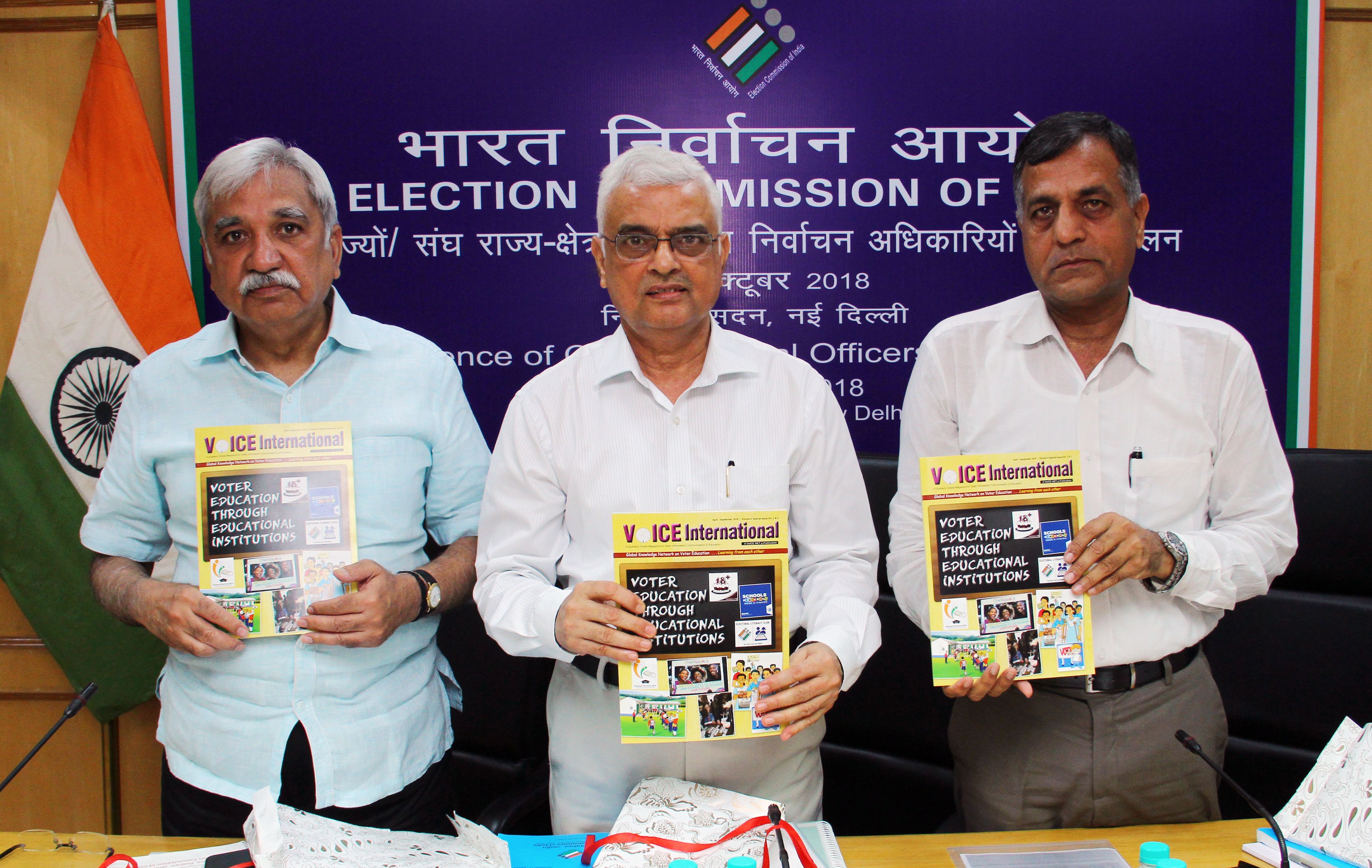 The Chief Election Commissioner of India Mr. O P Rawat, Election Commissioners Mr. Sunil Arora and Mr. Ashok Lavasa launched the special issue of the VoICE International(April-September 2018) magazine in Chief Electoral Officer’s Conference on October 4, 2018 at ECI Headquarters. The theme of the special issue (April – September 2018) of Volume II of the magazine is ‘Voter Education through Educational Institutions’. It primarily focuses on introducing greater electoral awareness and sensitivity among the future generation of voters and electoral participants; an issue that has great significance and relevance for investment in the future of Electoral Democracy. Apathy of the youth towards electoral participation and non-exercise of their franchise by a large proportion of them is a major concern in several democratic countries. In this respect, effective electoral literacy programmes through school and college level initiatives are an important means of encouraging participation of youth in the electoral process. Further, the outreach of electoral literacy initiatives can be increased manifold through the use of electronic, internet and social media. Most of the democracies across the world, conscious of the importance of such initiatives have taken significant steps towards introducing several initiatives toward their electoral literacy programmes using both formal and informal channels. This issue highlights such initiatives across the world. Apart from contributions on the core theme, the magazine also features other articles by member Election Management Bodies(EMBs) on other important and pertinent subjects. The e-book of the magazine is available at http://voicenet.in/. All the prior issues (e-book/ pdf) of VoICE International are available at http://voicenet.in/voiceinternational.htm. VoICE International is the quarterly e-publication on the VoICE.NET (Voter Information, Communication and Education Network) portal, a Global Knowledge Network for sharing knowledge, resources and expertise on Voter Education. VoICE.NET was launched on October 20, 2016 at the International Conference on Voter Education for Inclusive, Informed and Ethical Participation held at New Delhi. The Global Knowledge Network is a part of the New Delhi Declaration adopted at the Conference by the 25 Election Management Bodies and representatives from UNDP, International IDEA, IFES and Malaysian Commonwealth Studies Centre. At present, VoICE.NET has 27 members, which includes Election Management Bodies (EMBs) across the world and reputed international organizations. The portal is managed by Election Commission of India.
The Chief Election Commissioner of India Mr. O P Rawat, Election Commissioners Mr. Sunil Arora and Mr. Ashok Lavasa launched the special issue of the VoICE International(April-September 2018) magazine in Chief Electoral Officer’s Conference on October 4, 2018 at ECI Headquarters. The theme of the special issue (April – September 2018) of Volume II of the magazine is ‘Voter Education through Educational Institutions’. It primarily focuses on introducing greater electoral awareness and sensitivity among the future generation of voters and electoral participants; an issue that has great significance and relevance for investment in the future of Electoral Democracy. Apathy of the youth towards electoral participation and non-exercise of their franchise by a large proportion of them is a major concern in several democratic countries. In this respect, effective electoral literacy programmes through school and college level initiatives are an important means of encouraging participation of youth in the electoral process. Further, the outreach of electoral literacy initiatives can be increased manifold through the use of electronic, internet and social media. Most of the democracies across the world, conscious of the importance of such initiatives have taken significant steps towards introducing several initiatives toward their electoral literacy programmes using both formal and informal channels. This issue highlights such initiatives across the world. Apart from contributions on the core theme, the magazine also features other articles by member Election Management Bodies(EMBs) on other important and pertinent subjects. The e-book of the magazine is available at http://voicenet.in/. All the prior issues (e-book/ pdf) of VoICE International are available at http://voicenet.in/voiceinternational.htm. VoICE International is the quarterly e-publication on the VoICE.NET (Voter Information, Communication and Education Network) portal, a Global Knowledge Network for sharing knowledge, resources and expertise on Voter Education. VoICE.NET was launched on October 20, 2016 at the International Conference on Voter Education for Inclusive, Informed and Ethical Participation held at New Delhi. The Global Knowledge Network is a part of the New Delhi Declaration adopted at the Conference by the 25 Election Management Bodies and representatives from UNDP, International IDEA, IFES and Malaysian Commonwealth Studies Centre. At present, VoICE.NET has 27 members, which includes Election Management Bodies (EMBs) across the world and reputed international organizations. The portal is managed by Election Commission of India. -
9
Election preparations in 5 States
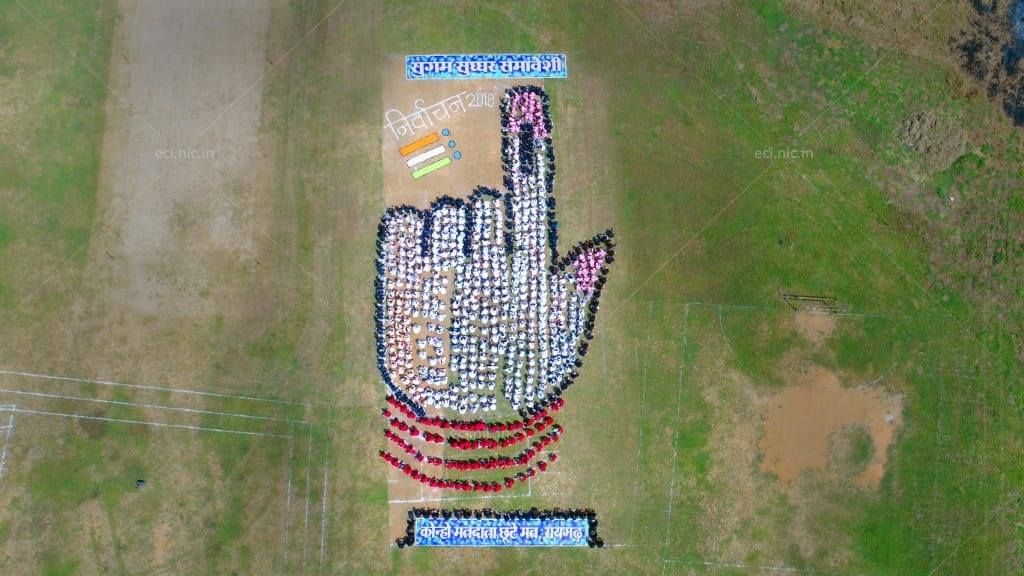 Preprations in the five states of Chhatisgarh, Madhya Pradesh, Mizoram, Rajasthan and Telangana are in full swing. The dates of elections are as follows: Chhattisgarh - 12th and 20th November (2 phases) Madhya Pradesh - 28th November Mizoram - 28th November Rajasthan - 7th December Telangana - 7th December Counting for all the five states will be held on December 11, 2018. Voter Facilitation Centres have been activated in all the districts. Special campaign including hands on experience, has been undertaken on EVM & VVPAT awareness starting September 2018. Camps are being organised to give hands-on experience to people on EVM and VVPAT especially to familarise them on the use of VVPAT for verifying their vote. Awareness film on EVM and VVPAT has been developed and widely disseminated through Cinemas, Cable TV besides Social Media including whatsapp besides others. With focus on 'Accessible Elections', special initiatives have been rolled out to facilitate persons with disabilities. Besides making awareness material accessible, extending EPIC in Braille for blind electors, sensitization of polling officials and making polling station accessible, electors with disabilities are being mapped Polling Station wise so that requisite facilitation can be extended on poll day. Special camps are being held for PwDs to assist them for enrolment as well as to apprise them on various facilitation measures being extended at the Polling station for their participation. The Commission has also directed to issue Accessible Photo Voter Slips with Braille Features to Persons with Visual Impairment or Blind. Mobilisation activities are being taken up across the states covering all polling stations to motivate people toward electoral participation. Information regarding dates, identity documents needed, do's and don't's at polling station are being disseminated besides promotion ethical and informed participation. Information on NOTA is also being disseminated. Students are supporting ECI SVEEP initiatives by participating in large numbers in painting competitions, sports activities and similar events being organised by the election officials. Electoral Literacy Clubs and Chunav pathshalas launched few months back are proving to be vibrant platforms for disseminating information on the electoral process. Voter Guide (in Vernacular / English) shall be handed over to every household ahead of the elections, giving information about the date and time of polls, contact details of the BLOs, important websites, helpline numbers, documents required for identification at the polling station besides other important information including the Do’s and Don’ts for voters at the polling station. This Voter Guide Brochure will be distributed along with the Photo Voter Slips by the BLOs. Pics: Mock elections being done in Mizoram; EVM/VVPAT demo being given to a PwD elector in telangana; Human Chain formed in Chhattisgarh; Painting by students in Madhya Pradesh; School students painting in Rajasthan; Voter Guide; Elections were announced by the Commission on 5th October 2018. the detailed press note can be seen at https://eci.nic.in/eci_main1/Current/PN_06102018.pdf
Preprations in the five states of Chhatisgarh, Madhya Pradesh, Mizoram, Rajasthan and Telangana are in full swing. The dates of elections are as follows: Chhattisgarh - 12th and 20th November (2 phases) Madhya Pradesh - 28th November Mizoram - 28th November Rajasthan - 7th December Telangana - 7th December Counting for all the five states will be held on December 11, 2018. Voter Facilitation Centres have been activated in all the districts. Special campaign including hands on experience, has been undertaken on EVM & VVPAT awareness starting September 2018. Camps are being organised to give hands-on experience to people on EVM and VVPAT especially to familarise them on the use of VVPAT for verifying their vote. Awareness film on EVM and VVPAT has been developed and widely disseminated through Cinemas, Cable TV besides Social Media including whatsapp besides others. With focus on 'Accessible Elections', special initiatives have been rolled out to facilitate persons with disabilities. Besides making awareness material accessible, extending EPIC in Braille for blind electors, sensitization of polling officials and making polling station accessible, electors with disabilities are being mapped Polling Station wise so that requisite facilitation can be extended on poll day. Special camps are being held for PwDs to assist them for enrolment as well as to apprise them on various facilitation measures being extended at the Polling station for their participation. The Commission has also directed to issue Accessible Photo Voter Slips with Braille Features to Persons with Visual Impairment or Blind. Mobilisation activities are being taken up across the states covering all polling stations to motivate people toward electoral participation. Information regarding dates, identity documents needed, do's and don't's at polling station are being disseminated besides promotion ethical and informed participation. Information on NOTA is also being disseminated. Students are supporting ECI SVEEP initiatives by participating in large numbers in painting competitions, sports activities and similar events being organised by the election officials. Electoral Literacy Clubs and Chunav pathshalas launched few months back are proving to be vibrant platforms for disseminating information on the electoral process. Voter Guide (in Vernacular / English) shall be handed over to every household ahead of the elections, giving information about the date and time of polls, contact details of the BLOs, important websites, helpline numbers, documents required for identification at the polling station besides other important information including the Do’s and Don’ts for voters at the polling station. This Voter Guide Brochure will be distributed along with the Photo Voter Slips by the BLOs. Pics: Mock elections being done in Mizoram; EVM/VVPAT demo being given to a PwD elector in telangana; Human Chain formed in Chhattisgarh; Painting by students in Madhya Pradesh; School students painting in Rajasthan; Voter Guide; Elections were announced by the Commission on 5th October 2018. the detailed press note can be seen at https://eci.nic.in/eci_main1/Current/PN_06102018.pdf
-
1

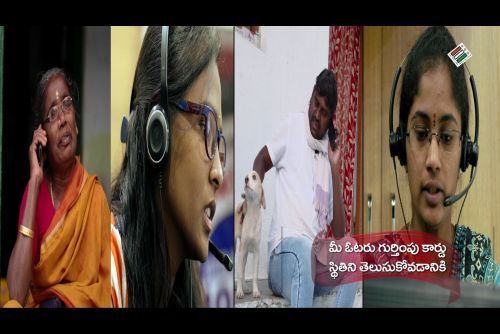



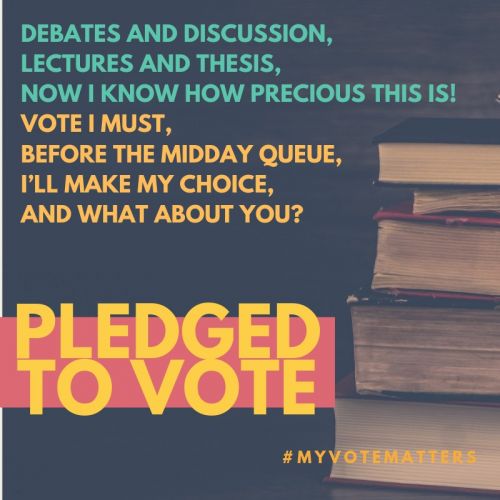

.jpeg.83142042611ae65249594cdd9f05f158.jpeg)

